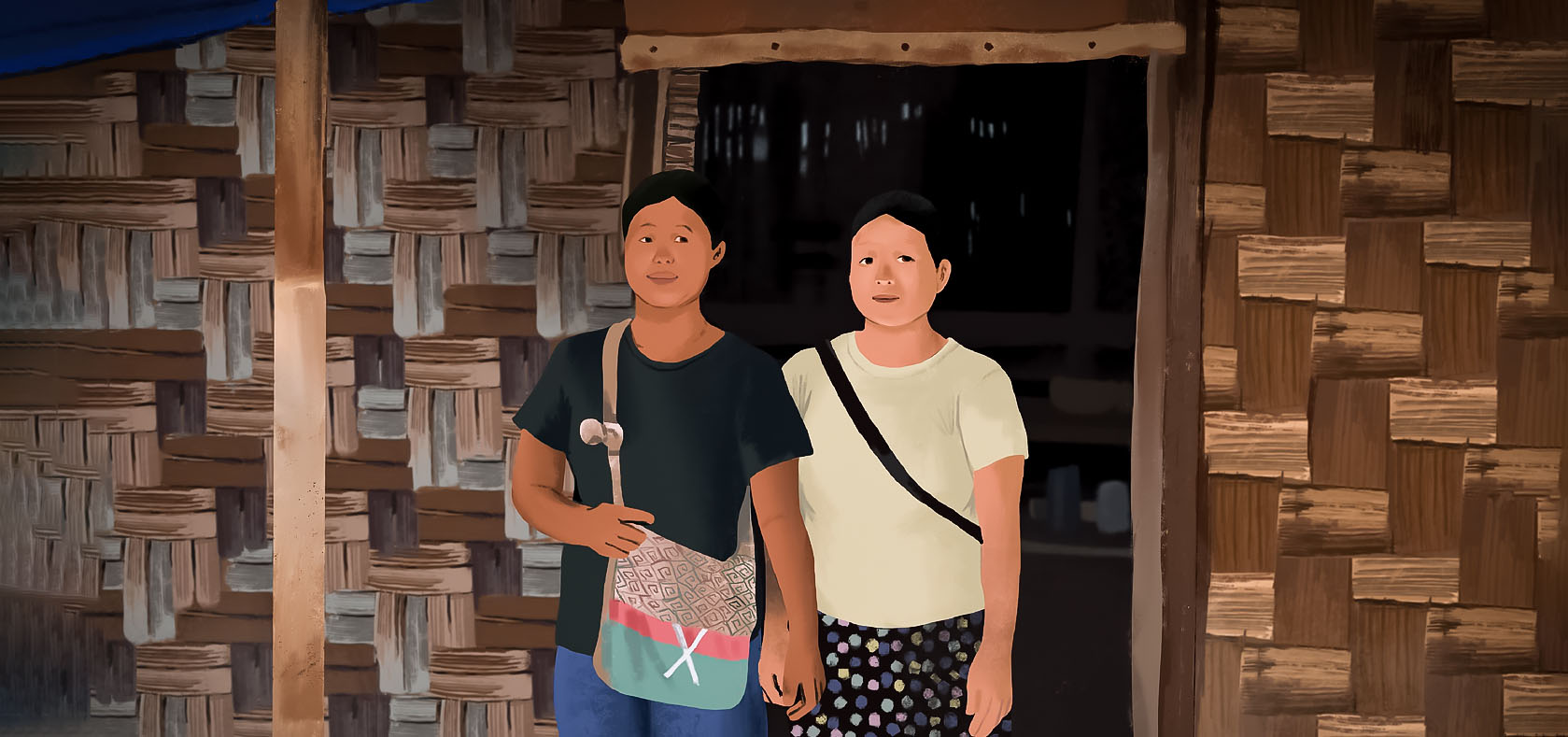Innovation training helps dreams come true for minority ethnic women in Myanmar
Date:
Authors: Tsitsi Matope and Seng Bu

Kachin State, Myanmar — On International Women’s Day, and Daw Htu Tawng, 33, and Daw Ja Nan, 34, are giggling together in the kitchen of their restaurant in north-eastern Myanmar. Daw Htu Tawng is holding some spices; she adds a dash of black pepper in a pot of noodles while the other stirs the food. The air holds a fusion of mouth-watering aromas. With this year’s International Women’s Day promoting Innovation and Technology for Gender Equality, it is a perfect setting to celebrate women who have used their new cookery and business skills to establish their own restaurant, breaking barriers for women in the catering business.
“The business is doing well,” said Daw Ja Nan, a mother of three. “Our best sellers are the ban sai salad, and the spicy noodles garnished with sweet-smelling herbs, which makes the taste of our home so much alive in our popular noodles.”
When they first established their restaurant Ma Join Lusha Seng (meaning “origin” in Kachin), some people did not believe the enterprise would last a month. However, the two women have proved that with enough support, women too can create and sustain profit-making businesses. In the last 10 months, the two chefs have been preparing hot delicious meals, and trying new recipes that have kept their many customers happy.
After receiving a cookery and business management training course through an initiative funded by the UN Central Emergency Response Fund (CERF), the business partners received the opportunity to learn diverse ways of cooking many types of food. The new skills gave them the confidence to start their own small restaurant, outside Pa Ka Htawng Camp 3 in Kachin State. They settled in this camp with their families after an armed conflict between the Myanmar armed forces and the Kachin ethnic armed group in 2021 forced them to leave their village in Sein Lone in Man Si Township. And using their innovation, they are now able to run their business, working safely and generating an income helping them to look after their families.
"Education is important because it empowers you and makes you confident to take that bold step towards helping yourself, your family and your community..”
— Daw Htu Tawng, an entrepreneur in Myanmar
Through the CERF multi-country programme in Myanmar, UN Women and the UN Population Fund (UNFPA) are collaborating with women’s civil society organizations to use technology and innovative ways to provide life-saving assistance, build capacity to address socio-economic challenges and enhance the protection of vulnerable women and girls from risks such as child marriage, human trafficking and sexual and gender-based violence (GBV).
The multi-country programme targets 69,029 women and girls in Kachin and Rakhine states with activities under UNFPA, improving communities’ access to quality and comprehensive prevention and response services for gender-based violence. For their part, UN Women is complementing these efforts through the provision of a series of trainings that support livelihoods such as cookery; sewing; hairdressing; livestock production; other life skills and cash assistance.
In May 2022, UN Women partnered with the Finnish Refugee Council to provide livelihood support, life skills and vocational training that targeted survivors of GBV and women and girls at risk of GBV. The aim was to transfer skills that would empower women to start income-generating enterprises. Thirty women participated in a cookery and business management skills training that changed the lives of Daw Ja Nan and Daw Htu Tawng.
“The interventions have so far demonstrated the ability to help prevent displaced women from falling prey to unsafe work and working environments and selling family property to earn a living,” mother-of-two Daw Htu Tawng said.
After completing their one-month training course, the women borrowed one million Kyat (USD 500) from a relative to start their business. With a daily expenditure of 42 Kyat on ingredients, the business is now making a profit of 31 Kyat each day. Most of their clients are camp residents while others are migrant workers.
“We are now able to look after our families and also use some of the money to pay back our loan,” Daw Ja Nan said. The business partners dream of one day opening a bigger restaurant and expanding to provide specialized catering services at events such as weddings and graduation parties. Increasing their profits means a lot to the women who are passionate about their children’s education and dream of sending them to good universities in Yangon.
“Education is important because it empowers you and makes you confident to take that bold step towards helping yourself, your family and your community,” Daw Htu Tawng said. We are grateful for the support we have received and wish there could be more training opportunities to support other women to also start other types of businesses.”
About the CERF-funded project in Myanmar
The overall aim of the programme funded by the global Central Emergency Response Fund (CERF) is to provide survivors of gender-based violence and those at risk with multi-sectoral services and livelihood opportunities and to facilitate their economic empowerment. As part of localization efforts, 30 per cent of the funding has been allocated directly to local women-led organizations and women’s rights organizations, with a view to enhancing their operational capacity. The programme also contributes to the protection and needs of at-risk marginalized groups. The cookery and financial management skills training course described in the story is an integral part of the livelihood opportunities provided by two local partner organizations to women living in camps for internally displaced people, including GBV survivors.